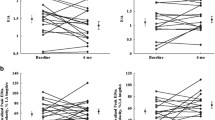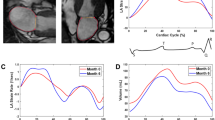Abstract
Background
Several studies demonstrated that mineralocorticoid receptor antagonists (MRAs) are able to prevent myocardial and vascular fibrosis, and left ventricular (LV) remodeling in patients with systolic chronic heart failure (HF) and mild symptoms. Ventricular-arterial coupling (VAC) should be influenced by anti-fibrotic interventions. We have assessed the effects of spironolactone on VAC and its components, aortic elastance (Ea) and end-systolic LV elastance (Ees), in patients with HF.
Methods and results
Changes from baseline in VAC were compared between 65 patients treated with spironolactone and 32 controls not receiving MRAs. All patients had HF, reduced LVEF with reduced LV ejection fraction (LVEF) and New York Heart Association (NYHA) functional class I–II symptoms, and underwent transthoracic echocardiography at baseline and after 6 months. VAC was estimated by the modified single-beat method as Ea/Ees. Parameters of LV function improved after 6 month treatment with spironolactone with an increase in the LVEF from 34 ± 8 to 39 ± 8 % (p < 0.001). Spironolactone increased Ees from 1.32 ± 0.38 to 1.57 ± 0.42 mmHg/mL (p < 0.001) and reduced VAC from 2.03 ± 0.59 to 1.66 ± 0.31 (p < 0.001), but did not affect Ea and V0 (LV volume at end-systolic pressure of 0 mmHg). No change in any of these parameters occurred in the control group.
Conclusions
6-month therapy with spironolactone improved VAC mainly through its effect on Ees in patients with mild HF.


Similar content being viewed by others
References
McMurray JJ, Adamopoulos S, Anker SD, Auricchio A, Böhm M, Dickstein K, Falk V, Filippatos G, Fonseca C, Gomez-Sanchez MA, Jaarsma T, Køber L, Lip GY, Maggioni AP, Parkhomenko A, Pieske BM, Popescu BA, Rønnevik PK, Rutten FH, Schwitter J, Seferovic P, Stepinska J, Trindade PT, Voors AA, Zannad F, Zeiher A, Committee ESC, For Practice Guidelines (2012) ESC Guidelines for the diagnosis and treatment of acute and chronic heart failure 2012: the task force for the diagnosis and treatment of acute and chronic heart failure 2012 of the European Society of Cardiology. Developed in collaboration with the heart failure association (HFA) of the ESC. Eur Heart J 33:1787–1847
Yancy CW, Jessup M, Bozkurt B, Butler J, Casey DE Jr, Drazner MH, Fonarow GC, Geraci SA, Horwich T, Januzzi JL, Johnson MR, Kasper EK, Levy WC, Masoudi FA, McBride PE, McMurray JJ, Mitchell JE, Peterson PN, Riegel B, Sam F, Stevenson LW, Tang WH, Tsai EJ, Wilkoff BL, American College of Cardiology Foundation, American Heart Association Task Force on Practice Guidelines (2013) 2013 ACCF/AHA guideline for the management of heart failure: a report of the American College of Cardiology Foundation/American Heart Association Task Force on practice guidelines. Circulation 128:e240–e319
Struthers AD (2004) The clinical implications of aldosterone escape in congestive heart failure. Eur J Heart Fail 6:539–545
Zieman SJ, Melenovsky V, Kass DA (2005) Mechanisms, pathophysiology, and therapy of arterial stiffness. Arterioscler Thromb Vasc Biol 25:932–943
Lacolley P, Labat C, Pujol A, Delcayre C, Benetos A, Safar M (2002) Increased carotid wall elastic modulus and fibronectin in aldosterone-salt-treated rats: effects of eplerenone. Circulation 106:2848–2853
Nehme JA, Lacolley P, Labat C, Challande P, Robidel E, Perret C, Leenhardt A, Safar ME, Delcayre C, Milliez P (2005) Spironolactone improves carotid artery fibrosis and distensibility in rat post-ischaemic heart failure. J Mol Cell Cardiol 39:511–519
Lacolley P, Safar ME, Lucet B, Ledudal K, Labat C, Benetos A (2001) Prevention of aortic and cardiac fibrosis by spironolactone in old normotensive rats. J Am Coll Cardiol 37:662–667
Baldo MP, Forechi L, Morra EA, Zaniqueli D, Machado RC, Lunz W, Rodrigues SL, Mill JG (2011) Long-term use of low-dose spironolactone in spontaneously hypertensive rats: effects on left ventricular hypertrophy and stiffness. Pharmacol Rep 63:975–982
Kithas PA, Supiano MA (2010) Spironolactone and hydrochlorothiazide decrease vascular stiffness and blood pressure in geriatric hypertension. J Am Geriatr Soc 58:1327–1332
Pitt B, Reichek N, Willenbrock R, Zannad F, Phillips RA, Roniker B, Kleiman J, Krause S, Burns D, Williams GH (2003) Effects of eplerenone, enalapril, and eplerenone/enalapril in patients with essential hypertension and left ventricular hypertrophy: the 4E-left ventricular hypertrophy study. Circulation 108:1831–1838
Brilla CG (2000) Aldosterone and myocardial fibrosis in heart failure. Herz 25:299–306
Vizzardi E, D’Aloia A, Giubbini R, Bordonali T, Bugatti S, Pezzali N, Romeo A, Dei Cas A, Metra M, Dei Cas L (2010) Effect of spironolactone on left ventricular ejection fraction and volumes in patients with class I or II heart failure. Am J Cardiol 106:1292–1296
Chan AK, Sanderson JE, Wang T, Lam W, Yip G, Wang M, Lam YY, Zhang Y, Yeung L, Wu EB, Chan WW, Wong JT, So N, Yu CM (2007) Aldosterone receptor antagonism induces reverse remodeling when added to angiotensin receptor blockade in chronic heart failure. J Am Coll Cardiol 50:591–596
Kosmala W, Przewlocka-Kosmala M, Szczepanik-Osadnik H, Mysiak A, Marwick TH (2013) Fibrosis and cardiac function in obesity: a randomised controlled trial of aldosterone blockade. Heart 99:320–326
Boccanelli A, Mureddu GF, Cacciatore G, Clemenza F, Di Lenarda A, Gavazzi A, Porcu M, Latini R, Lucci D, Maggioni AP, Masson S, Vanasia M, de Simone G, Investigators AREAIN-CHF (2009) Anti-remodelling effect of canrenone in patients with mild chronic heart failure (AREA IN-CHF study): final results. Eur J Heart Fail 11:68–76
Gao X, Peng L, Adhikari CM, Lin J, Zuo Z (2007) Spironolactone reduced arrhythmia and maintained magnesium homeostasis in patients with congestive heart failure. J Card Fail 13:170–177
Tsutamoto T, Wada A, Maeda K, Mabuchi N, Hayashi M, Tsutsui T, Ohnishi M, Sawaki M, Fujii M, Matsumoto T, Matsui T, Kinoshita M (2001) Effect of spironolactone on plasma brain natriuretic peptide and left ventricular remodeling in patients with congestive heart failure. J Am Coll Cardiol 37:1228–1233
Cicoira M, Zanolla L, Rossi A, Golia G, Franceschini L, Brighetti G, Marino P, Zardini P (2002) Long-term, dose-dependent effects of spironolactone on left ventricular function and exercise tolerance in patients with chronic heart failure. J Am Coll Cardiol 40:304–310
Akbulut M, Ozbay Y, Ilkay E, Karaca I, Arslan N (2003) Effects of spironolactone and metoprolol on QT dispersion in heart failure. Jpn Heart J 44:681–692
Kasama S, Toyama T, Sumino H, Matsumoto N, Sato Y, Kumakura H, Takayama Y, Ichikawa S, Suzuki T, Kurabayashi M (2007) Additive effects of spironolactone and candesartan on cardiac sympathetic nerve activity and left ventricular remodeling in patients with congestive heart failure. J Nucl Med 48:1993–2000
Taheri S, Mortazavi M, Shahidi S, Pourmoghadas A, Garakyaraghi M, Seirafian S, Eshaghian A, Ghassami M (2009) Spironolactone in chronic hemodialysis patients improves cardiac function. Saudi J Kidney Dis Transpl 20:392–397
Kimura M, Ogawa H, Wakeyama T, Takaki A, Iwami T, Hadano Y, Mochizuki M, Hiratsuka A, Shimizu A, Matsuzaki M (2011) Effects of mineralocorticoid receptor antagonist spironolactone on atrial conduction and remodeling in patients with heart failure. J Cardiol 57:208–214
Swedberg K, Zannad F, McMurray JJ, Krum H, van Veldhuisen DJ, Shi H, Vincent J, Pitt B; EMPHASIS-HF Study Investigators (2012) Eplerenone and atrial fibrillation in mild systolic heart failure: results from the EMPHASIS-HF (Eplerenone in Mild Patients Hospitalization And SurvIval Study in Heart Failure) study. J Am Coll Cardiol 59:1598–1603
Simopoulos V, Tagarakis G, Hatziefthimiou A, Skoularigis I, Triposkiadis F, Trantou V, Tsilimingas N, Aidonidis I (2015) Effectiveness of aldosterone antagonists for preventing atrial fibrillation after cardiac surgery in patients with systolic heart failure: a retrospective study. Clin Res Cardiol 104:31–37
Chirinos JA (2013) Ventricular-arterial coupling: invasive and non-invasive assessment. Artery Res 7:2–14
Ky B, French B, May Khan A, Plappert T, Wang A, Chirinos JA, Fang JC, Sweitzer NK, Borlaug BA, Kass DA, St John Sutton M, Cappola TP (2013) Ventricular-arterial coupling, remodeling, and prognosis in chronic heart failure. J Am Coll Cardiol 62:1165–1172
Antonini-Canterin F, Enache R, Popescu BA, Popescu AC, Ginghina C, Leiballi E, Piazza R, Pavan D, Rubin D, Cappelletti P, Nicolosi GL (2009) Prognostic value of ventricular-arterial coupling and B-type natriuretic peptide in patients after myocardial infarction: a five-year follow-up study. J Am Soc Echocardiogr 22:1239–1245
Lang RM, Bierig M, Devereux RB, Flachskampf FA, Foster E, Pellikka PA, Picard MH, Roman MJ, Seward J, Shanewise JS, Solomon SD, Spencer KT, Sutton MS, Stewart WJ, Chamber Quantification Writing Group, American Society of Echocardiography’s Guidelines and Standards Committee, European Association of Echocardiography (2005) Recommendations for chamber quantification: a report from the American Society of Echocardiography’s Guidelines and Standards Committee and the Chamber Quantification Writing Group, developed in conjunction with the European Association of Echocardiography, a branch of the European Society of Cardiology. J Am Soc Echocardiogr 18:1440–1463
Nagueh SF, Appleton CP, Gillebert TC, Marino PN, Oh JK, Smiseth OA, Waggoner AD, Flachskampf FA, Pellikka PA, Evangelista A (2009) Recommendations for the evaluation of left ventricular diastolic function by echocardiography. J Am Soc Echocardiogr 22:107–133
Schiller NB, Shah PM, Crawford M, DeMaria A, Devereux R, Feigenbaum H, Gutgesell H, Reichek N, Sahn D, Schnittger I (1989) Recommendations for quantitation of the left ventricle by two-dimensional echocardiography. J Am Soc Echocardiogr 2:358–367
Vizzardi E, D’Aloia A, Bordonali T, Bugatti S, Piovanelli B, Bonadei I, Quinzani F, Rovetta R, Vaccari A, Curnis A, Dei Cas L (2012) Long-term prognostic value of the right ventricular myocardial performance index compared to other indexes of right ventricular function in patients with moderate chronic heart failure. Echocardiography 29:773–778
Hatle L, Sutherland GR (2000) Regional myocardial function—a new approach. Eur Heart J 21:1337–1357
Rudski LG, Lai WW, Afilalo J, Hua L, Handschumacher MD, Chandrasekaran K, Solomon SD, Louie EK, Schiller NB (2010) Guidelines for the echocardiographic assessment of the right heart in adults: a report from the American Society of Echocardiography endorsed by the European Association of Echocardiography, a registered branch of the European Society of Cardiology, and the Canadian Society of Echocardiography. J Am Soc Echocardiogr 23:685–713
Dubin J, Wallerson DC, Cody RJ, Devereux RB (1990) Comparative accuracy of Doppler echocardiographic methods for clinical stroke volume determination. Am Heart J 120:116–123
Kelly RP, Ting CT, Yang TM, Liu CP, Maughan WL, Chang MS, Kass DA (1992) Effective arterial elastance as index of arterial vascular load in humans. Circulation 86:513–521
Chen CH, Fetics B, Nevo E, Rochitte CE, Chiou KR, Ding PA, Kawaguchi M, Kass DA (2001) Noninvasive single-beat determination of left ventricular end-systolic elastance in humans. J Am Coll Cardiol 38:2028–2034
Savoia C, Touyz RM, Amiri F, Schiffrin EL (2008) Selective mineralocorticoid receptor blocker eplerenone reduces resistance artery stiffness in hypertensive patients. Hypertension 51:432–439
Nehme J, Mercier N, Labat C, Benetos A, Safar ME, Delcayre C, Lacolley P (2006) Differences between cardiac and arterial fibrosis and stiffness in aldosterone-salt rats: effect of eplerenone. J Renin Angiotensin Aldosterone Syst 7:31–39
von Scheidt W, Zugck C, Pauschinger M, Hambrecht R, Bruder O, Hartmann A, Rauchhaus M, Zahn R, Brachmann J, Tebbe U, Neumann T, Strasser RH, Böhm M, Störk S, Hochadel M, Heidemann P, Senges J (2014) Characteristics, management modalities and outcome in chronic systolic heart failure patients treated in tertiary care centers: results from the EVIdence based TreAtment in Heart Failure (EVITA-HF) registry. Clin Res Cardiol 103:1006–1014
Zugck C, Franke J, Gelbrich G, Frankenstein L, Scheffold T, Pankuweit S, Duengen HD, Regitz-Zagrosek V, Pieske B, Neumann T, Rauchhaus M, Angermann CE, Katus HA, Ertl GE, Störk S (2012) Implementation of pharmacotherapy guidelines in heart failure: experience from the German Competence Network Heart Failure. Clin Res Cardiol 101:263–272
Tebbe U, Tschöpe C, Wirtz JH, Lokies J, Turgonyi E, Bramlage P, Strunz AM, Lins K, Böhm M (2014) Registry in Germany focusing on level-specific and evidence-based decision finding in the treatment of heart failure: REFLECT-HF. Clin Res Cardiol 103:665–673
Author information
Authors and Affiliations
Corresponding author
Rights and permissions
About this article
Cite this article
Vizzardi, E., Sciatti, E., Bonadei, I. et al. Effects of spironolactone on ventricular-arterial coupling in patients with chronic systolic heart failure and mild symptoms. Clin Res Cardiol 104, 1078–1087 (2015). https://doi.org/10.1007/s00392-015-0877-5
Received:
Accepted:
Published:
Issue Date:
DOI: https://doi.org/10.1007/s00392-015-0877-5




